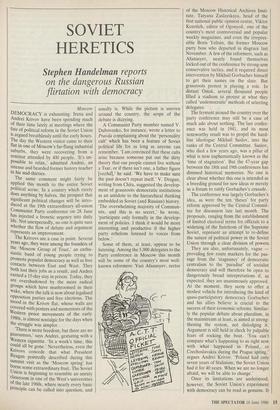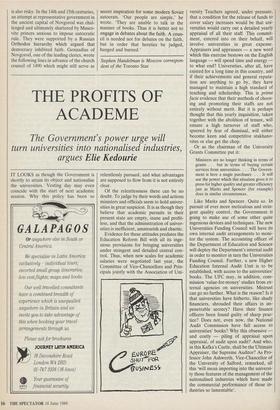SOVIET HERETICS
Stephen Handelman reports
on the dangerous Russian flirtation with democracy
Moscow DEMOCRACY is exhausting. Irena and Andrei Krivov have been spending much of their time lately at meetings where the fate of political reform in the Soviet Union is argued breathlessly until the early hours. The day the Western visitor came to their flat in one of Moscow's far-flung industrial suburbs, they were recovering from a seminar attended by 400 people. 'It's im- possible to relax,' admitted Andrei, an intense and bearded former history teacher in his mid-thirties.
The same comment might fairly be applied this month to the entire Soviet political scene. In a country which rarely does anything by halves, the prospect that significant political changes will be intro- duced at the 19th extraordinary all-union Communist Party conference on 28 June has injected a frenetic urgency into daily life. Not unexpectedly, no one is quite sure whether the flow of debate and argument represents an improvement. The Krivovs are a case in point. Several years ago, they were among the founders of the 'Moscow Group of Trust,' an enthu- siastic band of young people trying to promote populist democracy as well as free contacts between East and West. They both lost their jobs as a result, and Andrei earned a 15-day stay in prison. Today, they are overshadowed by the more radical groups which have mushroomed in their wake, where the talk is now about legalised opposition parties and free elections. The mood in the Krivov flat, whose walls are covered with posters and mementoes of the Western peace movements of the early 1980s, is almost nostalgic for the days when the struggle was simpler. `There is more freedom, but there are no guarantees,' says Andrei, gesturing with a Western cigarette. 'In a week's time, this could all be gone.' Nevertheless, even the Krivovs concede that what President Reagan pointedly described during this summit visit as the 'Moscow spring' has borne some extraordinary fruit. The Soviet Union is beginning to resemble an unruly classroom in one of the West's universities of the late 1960s, where nearly every basic Principle can be called into question, and usually is. While the picture is uneven around the country, the scope of the debate is dizzying.
A Communist Party member named V. Dubovenko, for instance, wrote a letter to Pravda complaining about the 'personality cult' which has been a feature of Soviet political life for as long as anyone can remember. 'I am convinced that these cults arise because someone put out the dirty theory that our people cannot live without a Tsar, or if there isn't one, a father figure [vozhdl,' he said. 'We have to make sure the past doesn't repeat itself.' V. Dragun, writing from Chita, suggested the develop- ment of grassroots democratic institutions as an antidote to the hierarchical thinking embedded in Soviet (and Russian) history. `The overwhelming majority of Commun- ists, and this is no secret,' he wrote, `participate only formally in the develop- ment of policies. I think it would be more interesting and productive if the higher party echelons listened to voices from below.'
Some of them, at least, appear to be listening. Among the 5,000 delegates to the Party conference in Moscow this month will be some of the country's most well- known reformers: Yuri Afanasyev, rector of the Moscow Historical Archives Insti- tute, Tatyana Zaslayskaya, head of the first national public opinion centre, Viktor Korotich, editor of Ogonyok, one of the country's most controversial and popular weekly magazines, and even the irrepres- sible Boris Yeltsin, the former Moscow party boss who departed in disgrace last November. A few of the reformers, such as Afanasyev, nearly found themselves locked out of the conference by strong-arm conservative tactics, and it required direct intervention by Mikhail Gorbachev himself to get their names on the slate. But grassroots protest is playing a role. In distant Omsk, several thousand people filled a stadium to protest at what they called 'undemocratic' methods of selecting delegates.
The ferment around the country over the party conference may still be a case of much ado about nothing. The last confer- ence was held in 1941, and its most noteworthy result was to propel the hard- line ideologue Mikhail Suslov, into the ranks of the Central Committee. Suslov, who died a few years ago, was a pillar of what is now euphemistically known as the `time of stagnation'. But the 47-year gap between the 18th and 19th conferences has dimmed historical memories. No one is clear about whether this one is intended as a breeding ground for new ideas or merely as a forum to ratify Gorbachev's crusade.
The conference was largely Gorbachev's idea, as were the ten 'theses' for party reform approved by the Central Commit- tee for discussion late last month. The proposals, ranging from the establishment of limited electoral terms for officials to a widening of the functions of the Supreme Soviet, represent an attempt to re-define the nature of political power in the Soviet Union through a clear division of powers.
They are also, unfortunately, vague providing few route markers for the pas- sage from the 'stagnancy' of democratic centralism to the 'paradise' of socialist democracy and will therefore be open to dangerously broad interpretations if, as expected, they are unanimously approved. At the moment, they seem to offer a modest vehicle for introducing the kind of quasi-participatory democracy Gorbachev and his allies believe is crucial to the success of their economic reforms. Similar- ly the popular debate about pluralism, in the mainstream at least, is aimed at streng- thening the system, not dislodging it. Argument is still held in check by palpable fears of rocking the boat. 'You can't compare what's happening to us right now with what happened in Poland, or Czechoslavakia during the Prague spring,' argues Andrei Krivov. 'Poland had only seven years of Stalinism, the Soviet Union had it for 40 years. When we are no longer afraid, we will be able to change.'
Once its limitations are understood, however, the Soviet Union's experiment with democracy can be read as genuine. It is also risky. In the 14th and 15th centuries, an attempt at representative government in the ancient capital of Novgorod was chal- lenged and ultimately shattered by Musco- vite princes anxious to impose autocratic rule. They were supported by a Russian Orthodox hierarchy which argued that democracy inhibited faith. Gennadius of Novgorod, one of the leading clerics, wrote the following lines in advance of the church council of 1490 which might still serve as secret inspiration for some modern Soviet autocrats. 'Our people are simple,' he wrote. 'They are unable to talk in the manner of books. Thus it is better not to engage in debates about the faith. A coun- cil is needed not for debates on the faith, but in order that heretics be judged, hanged and burned.'
Stephen Handelman is Moscow correspon- dent of the Toronto Star



















































 Previous page
Previous page